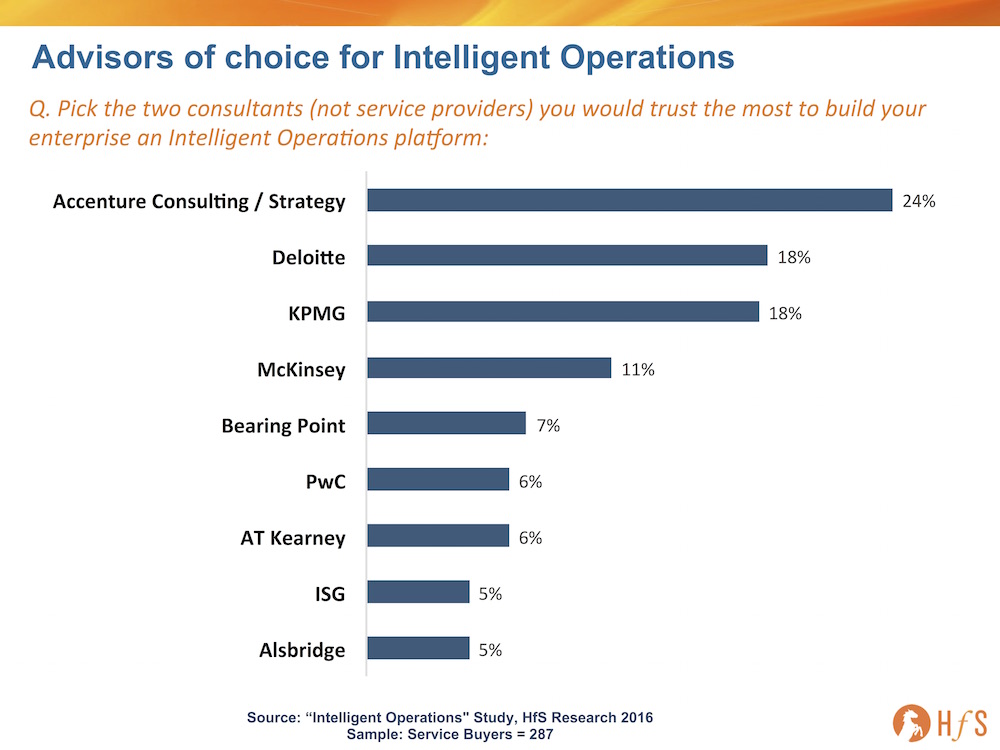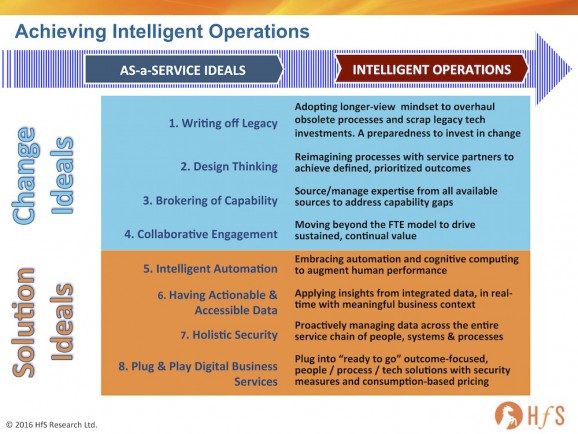 In 1588, the English dramatist John Lyly, in his Euphues and his England, wrote:
In 1588, the English dramatist John Lyly, in his Euphues and his England, wrote:
“…As neere is Fancie to Beautie, as the pricke to the Rose, as the stalke to the rynde, as the earth to the roote.”
In other words, “Beauty is in the eye of the Beholder”, which just about sums up how buyers perceive consultants when they need some serious rethinking and rewiring done to their operations to make them more intelligent:
So what’s actually surprising here?
In the past, you may have expected to see the pureplay strategy houses rule the roost, however, when we break down the Change Management and Solution Ideals enterprises need to achieve more Intelligent Operations, the focus shifts much more to using consultants with real change management, process transformation, analytics and automation chops… this is less about strategy, and more about just driving through the changes. Most company leaders know where they want to go – it’s now more about executing a plan to get there:
The Bottom-line: We’re moving to a world where the expertise enterprises need to be successful is really changing
One of the above firms asked me recently if it should start an automation practice. My response was “If you’re only asking me this now, then you’re already too late to the game”. In a nutshell, enterprise operations functions need genuine expertise in adopting a mindset to write off their legacy systems and obsolete processes – and a real understanding of how to approach automation and embrace digital opportunities.
A lot of this is about prioritizing what not to automate and learning where digital transformation actually makes business sense. This is about creating an operations function that can pivot and support the rapid changing needs of the front office with actionable data, that is secure and available in real-time. This is about defining and devising a digital strategy that has the customer at the forefront of the business and an operational support function that has the customer experience at its core.
Hence, consultants need talent that can not only think creatively with their clients, but also create an ongoing environment for writing off legacy, embracing change and being smart and proactive about leveraging automation and real digital strategies effectively. The speed at which some of these advisors must make the pivot from merely brokering transactional contracts, or spouting off some high level fluffy strategy, to supporting real change is critical – I’d imagine we’ll know in the next 9-12 months which ones will genuinely be helping their clients achieve these ambitious ideals.
Posted in : Business Process Outsourcing (BPO), Design Thinking, Digital Transformation, HfSResearch.com Homepage, IT Outsourcing / IT Services, Outsourcing Advisors, Robotic Process Automation, Security and Risk, sourcing-change, Talent in Sourcing, The As-a-Service Economy, the-industry-speaks









You have to hand it to Accenture – they’ve really been able to lead as a consultant and outsourcer for many years now. I still wonder why others like Deloitte never went into the outsourcing market,
Warren
Good data, Phil. Really says that clients are more about the “how to” than the “why” at this juncture.
@Warren – it’s a DNA thing – it took Accenture a long time to really strike the right cultural balance between outsourcing and consulting, being primarily a consulting-led business. As the outsourcing space growth slows and valuations drop, I can eventually see some consolidation across consultants and outsourcers – it just makes the perfect sense for As-a-Service delivery – having the talent to take clients through the Change Ideals, and the tech chops to manage the solution environment,
PF
@Chris – I really think most clients are experienced enough to figure out a lot more themselves, from a strategy perspective. It’s much more about how to effect change and get real on-the-shop-floor solutioning support these days…
PF
Very interesting and pithy summary. Backs up the feedback we’ve been seeing for some time now that clients of “consultancy” are wanting real-life experience and support for actually doing it rather than rehashing “best practice” views that are probably unachievable for the majority of clients and leaving them to their own devices. It’s also better news for the consultants themselves, though, and buyers need to beware of the land and expand strategies as phase 1 morphs into phase 2,3 etc., each uncosted at the start of the programme.
@Richard – as we discussed with “Being-as-a-Service“, it’s time we stopped talking about this scenario of “this was legacy and this is our future desired endstate”, otherwise we’ll just remain stuck in this perpetual stranglehold of never getting anywhere. We’ll always be a work-in-progress, a project that never finishes…
I do believe this is a terrific time to be in the consulting business, provided you can roll your sleeves up and really help clients – the opportunities being driven by disruptive customer engagement models and exciting developments in analytics, automation and cognitive tools and platforms are huge – and all clients need outside help. Noone has all the know-how internally to change their mindsets, plug all the skills/capability gaps and adopt all the right solutions themselves.
In a nutshell, this is what today’s advisors need to do to be effective:
1) Strategy Houses – need to create greater depth with ongoing change management programs and hire teams of Design Thinkers to help clients facilitate sessions with their partners (and internally on themselves). Just telling clients ideal scenarios is no longer enough – most know where there ultimately want to be, it’s now about getting there;
2) Operational Consultants – need to help clients change themselves, while being the partner of choice. Too many consultants today love their clients to be utterly helpless and completely reliant on them… but that’s only going to leave you with a lousy, failing client in this market. You need clients who are going to push you to improve your own capabilities in this market, or you will become legacy before you know it;
3) Sourcing Advisors – stay true to your contract capabilities (that’s what got you here in the first place), but really focus on the change agenda and facilitate outcome-centric engagements. Clients know this and want an advisor with real experience which can drive real changes to relationships to get them out of the linear FTE rut;
4) Outsourcing Providers – keep investing in your own consultative teams that are aligned to your clients engagements. Use the bench smartly to help clients’ “find new problems”, and not simply “solve old ones”. Having a deeper consulting layer will be your true differentiator moving forwards…
PF